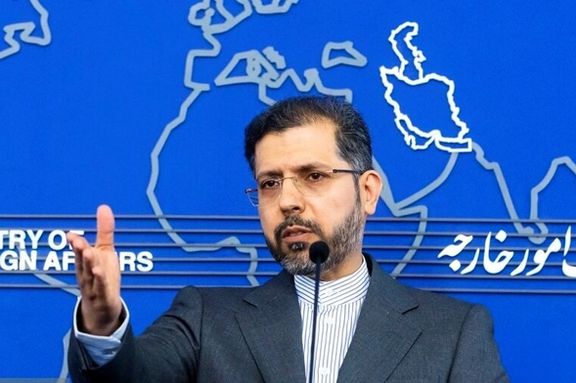Iran Again Accuses The US For Lack Of Progress In Nuclear Talks

Tehran blamed Washington Monday for lack of progress in talks to revive the 2015 nuclear deal saying it is ready to resume negotiation to achieve a “good deal”.

Tehran blamed Washington Monday for lack of progress in talks to revive the 2015 nuclear deal saying it is ready to resume negotiation to achieve a “good deal”.
"Even today, we are ready to return to Vienna to reach a good deal if Washington fulfils its commitments," foreign ministry spokesman Saeed Khatibzadeh said at his weekly televized news conference.
But a good deal for Iran means something very different from what the US says is possible. Year-long talks stalled in Vienna in March, reportedly because of Iran’s insistence to remove its Revolutionary Guard (IRGC) from the US list of Foreign Terrorist Organization (FTO).
The Biden Administration that came to office with a promise to restore the Obama-era Joint Comprehensive Plan of Action or JCPOA, says that it is ready to lift nuclear-related sanctions imposed by its predecessor and does not want to discuss “extraneous issues,” meaning sanctions imposed by the Trump administration over support for terrorism or other violations by Iran and Iranian entities.
Washington says it has made its final proposal to Tehran and awaits its decision. Even the Russian negotiator in the talks, Mikhail Ulyanov, says that 99 percent of all issues were resolved in Vienna before the negotiations stopped.
Middle East Eye reported on Sunday that Iran has dropped its demand for delisting the IRGC, “but has called for lifting of sanctions imposed by the US against Khatam-al Anbiya Central Headquarters,” the economic empire of the IRGC, which itself is implicated in IRGC's terrorism role.
If such a proposal has indeed been made by Iran, it does not appear that Washington is ready to entertain it. Last week, the State Department once again rejected the introduction of issues “extraneous” to the JCPOA.
The administration’s diplomatic approach toward Iran has come under questioning by Republicans and some Democrats who believe no concessions should be made to Tehran. The White House has recently appeared a bit more confrontational with Iran, imposing new sanctions on companies and individuals accused of helping Tehran to circumvent US sanctions.
Iran’s nuclear policy and indeed foreign policy is under the full control of Supreme Leader Ali Khamenei whose important pillar of support is the IRGC amid popular discontent and constant protests.
Khatibzadeh speaking about the achievements of the foreign ministry on Monday said, “The foreign ministry dedicated efforts to the lifting of sanctions. The foreign ministry has been the instrument of higher entities.” The term ‘higher entities’, in the Islamic Republic jargon, usually refers to the Supreme Leader and governmental bodies he controls, such as the Supreme National Security Council.
Speaking about President Joe Biden’s upcoming trip to the region, Khatibzadeh warned the United States and other countries “not to fall in a path designed” by Israel, which is most concerned about Tehran’s nuclear program and has vowed to stop its possible weaponization at any cost.
Iran’s efforts to improve ties with regional Arab countries which are also concerned about its nuclear, military and foreign policies, have not made much progress.
Khatibzadeh, speaking about diplomatic contacts with Saudi Arabia, the dominant Sunni power in the region, said it would be premature for Iran and Saudi Arabia to speak of reopening their embassies in each other's capitals, after they cut relation in early 2016.
Saudi Arabia, which has had cool relations with the Biden Administration is expected to use the president’s trip to change that.
"It is too early to talk about the reopening of embassies by Tehran and Riyadh," Khatibzadeh said, signalling that Iran’s relative isolation will continue.